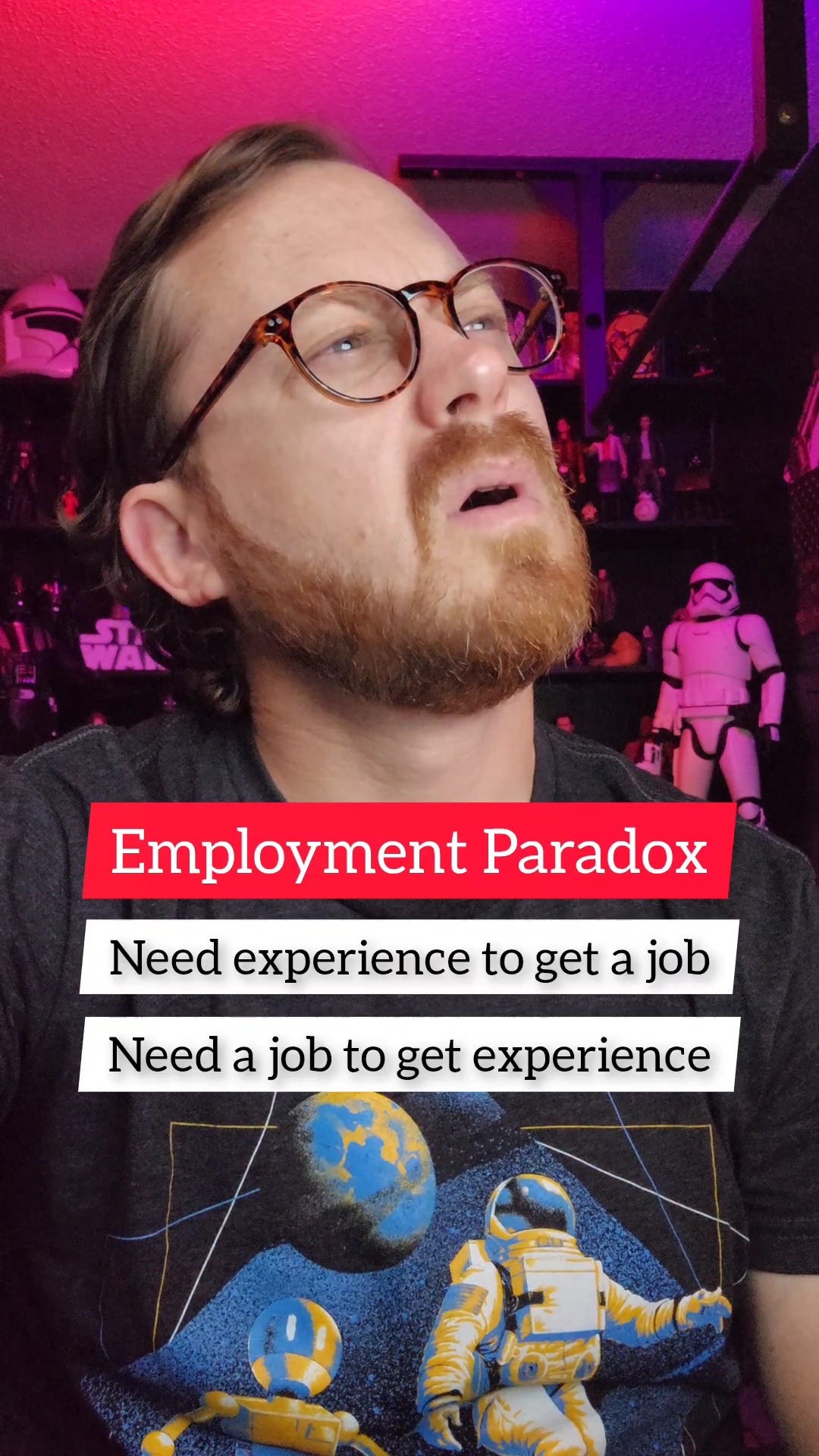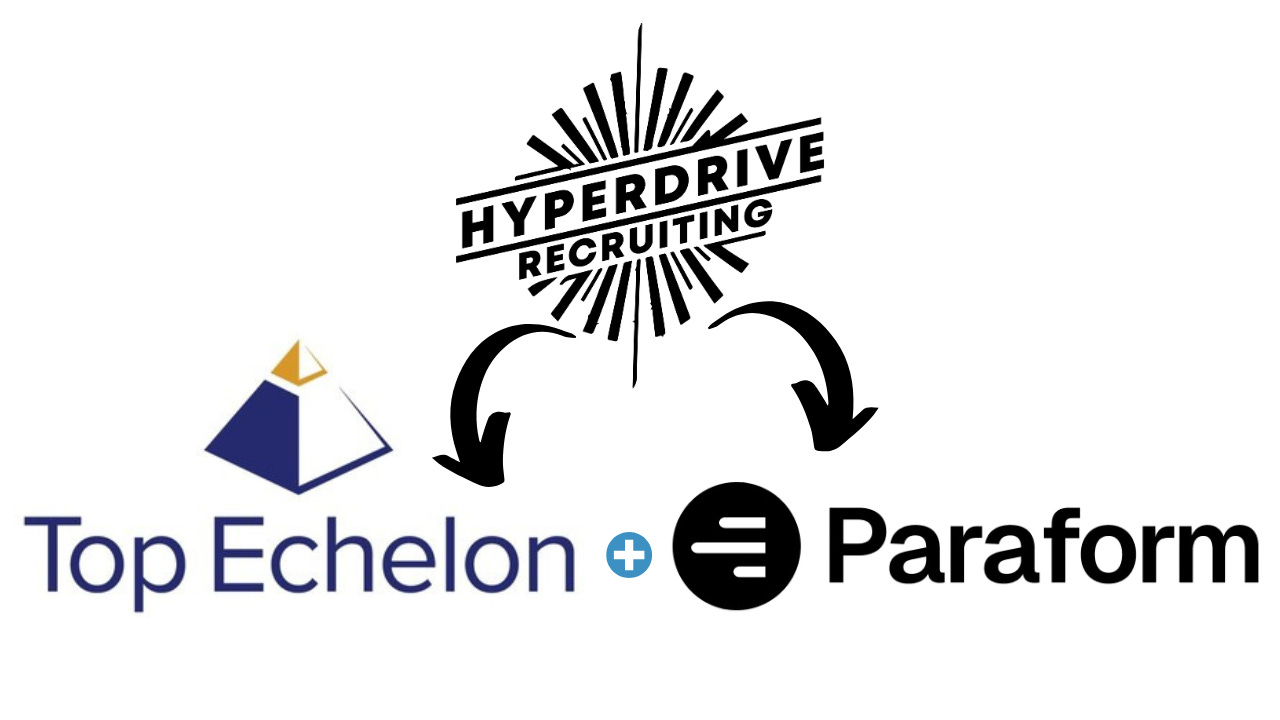The Employment Paradox
This month we have a ton to share. Job seeker advice. Job market news. 1 conference. 2 new podcasts and 2 guest podcasts. Major website announcements. 2 Membership announcements.
The employment paradox. It's like the world's cruelest joke for job seekers:
"You need experience to get a job, but you need a job to get experience"
It's frustrating, even for experienced folks trying to break into a new industry, but there are ways to navigate this illogical maze.
Here's some advice:
👉 Demonstrate Your Learning Ability: If you lack experience, you need to compensate with enthusiasm while learning publicly. Create videos about your learning journey, teach others as you go along. Review online courses you've taken, books you've read, or vlog about conferences you've attended. Show that you're not waiting for someone to teach you everything; you're already invested.
👉 Build Your Own Experience: If no one will give you the keys to the castle, build your own damn fort. Want to be in sales? Find a product to sell by commission only. Want to be in marketing? Start with affiliate marketing on social media like Tiktok shop or Amazon Affiliates. Want to be a data analyst? Find public datasets and share your insights on Substack. Want to be a software engineer? Build an app that's actually useful or make meaningful contributions to open-source projects on GitHub. Show employers you can do the work, even if you haven't been formally blessed by a paycheck yet.
👉 Network Like Your Life Depends On It: This is where the magic happens. Talk to people in the industry you want to be in. Conduct informational interviews. Ask them how they got started. Sometimes they know about unadvertised roles, can give you insights, or even refer you in. It's less about asking for a job outright and more about learning and getting on someone's radar. LinkedIn isn't just for selfies and bragging about promotions - use it to actually connect with people.
👉 Embrace the "Experience Lite" Options: Can't get the full-time gig? Look for internships, co-ops, apprenticeships, volunteer positions, or relevant freelance projects on Fiverr or Upwork. Offer to work for free for 2-3 weeks until you can be useful. These are your minor league tryouts. They give you something, anything, relevant to put on that resume.
👉 Target "Entry-Level" That Actually Means Entry-Level: Filter job boards ruthlessly. Look for roles specifically designed for people with minimal or no prior experience in that exact function or industry. Sometimes you have to take a step below your ideal level to get your foot in the door.
👉 Tailor Your Applications: Stop sending the same generic resume everywhere. Let's face it, it's not working. Read the job description. Identify keywords / requirements and weave those into your resume. Explain how your limited experience, projects, or transferable skills relate to what they need. Make it easy for the Applicant Tracking System and the human reading it to see you're not just spam.
It's not easy, and yes, the system is fundamentally ridiculous, but there are strategic ways to you present yourself as worth the gamble.
Missed Opportunities: Job Seekers Should Be Targeting Competitors
Target the competitors of the company you’re working at now or the company you just left. This is the only way to meet the industry requirement, which is the most underestimated requirement for most jobs you apply for.
After you apply to active jobs for the day, which is, let’s face it, only 2-3 hours of your day because anymore than that is mind numbing work.
Ask your favorite AI to give you the top 40 competitors of the company and tell it you’d like to see 10 enterprise, 10 mid-market, 10 small, and 10 emerging start-ups to give yourself a good mix of companies. Not all enterprise.
Leverage LinkedIn and spend time connecting with the employees of those companies. Target the leaders of the department you would work in like sales, marketing, or engineering. You can connect with 100 new people a week and you should be maxing those out weekly during your job search.
When those people accept your request, slide into their DMs, but don’t use a text message, use the mobile app and send an audio message. It’s just like a voicemail, but I like to call it a micro-interview. You can speak for up to 1 minute. Let them hear the inflection in your voice and the enthusiasm you have about connecting. Spend the first 10 seconds talking about that persons profile, something you have in common, or something you were interested in about their background.
Then roll into your elevator pitch. Do this as many times as possible. It’s all about volume. Crank those messages out and start conversations. When/if they respond ask for a coffee chat or ask how they would approach getting hired at the company. Network with the people who can help you.
For the folks who do not accept your request, remember, people are more likely to connect with you if you like and comment on their content. Everyone likes the dopamine hit of content engagement so don’t be shy. Engaging will give them a reason to accept your connection request. Rince and repeat.
Watch the video here
The Imposter Epidemic: Why American Jobs Are Under Siege by Fake Candidates (and What Companies Can Do)
Alright, folks, gather 'round, because there's a new villain in the hiring game, and it's not just a slightly embellished resume anymore. We're talking about a full-blown global imposter epidemic, where highly sophisticated fake candidates from around the world are unleashing a torrent of bogus applications on American companies. And let me tell you, it's making recruiters and hiring managers more skeptical than a cat eyeing a cucumber.
This isn't just about someone fudging a date on their last job; we're seeing deepfake technology, AI-generated profiles, and even "laptop farms" designed to make these imposters appear legitimate. The sheer volume of these fraudulent applications is forcing companies to treat every resume like a potential crime scene, meticulously searching for clues to its truthfulness. The stakes are high: wasted time, financial losses, reputational damage, and even potential cybersecurity breaches. Gartner even predicts that by 2028, a staggering one in four job candidates globally could be fake. That's not a typo, people. One. In. Four.
So, how did we get here? The explosion of remote work, while a boon for flexibility, has also provided a fertile ground for these bad actors to operate with greater anonymity. Combine that with increasingly accessible AI tools that can generate convincing resumes, cover letters, and even real-time interview responses, and you've got a recipe for a hiring nightmare. We're talking about candidates who can present polished LinkedIn profiles and identity credentials, and in some extreme cases, even use deepfake technology for video interviews, making it incredibly difficult to discern genuine applicants from imposters.
There is a significant lack of trust in the market which is why every resume is now under extreme scrutiny. I’m seeing the explosion of fake imposter candidates first hand, and I’m not alone - the recruiting community is exhausted by it. I've gone through all the politeness phases. At first you may continue the interview as planned. Then you start asking probing questions to seek admission. Then you start politely ending the interview early. Now I’m annoyed I just hang up the phone or end the meeting. I don’t even feel bad about it anymore. It's game over if enough red flags and strikes are discovered. The volume of fake imposters lately is just insane.
The immediate fallout? A profound trust deficit. Companies are now ultra-skeptical of every single resume that lands in their inbox. The traditional resume review, once a quick scan, has become a forensic examination. Recruiters are being forced to ask themselves:
Is this experience real, or is it a cleverly crafted AI fabrication?
Are these skills genuinely possessed, or are they just keywords plucked from the job description?
Is the person I'm talking to even the person who applied?
This intense scrutiny bogs down the hiring process, diverting precious resources and time away from engaging with truly qualified candidates. It also creates a less-than-ideal experience for legitimate job seekers, who might feel unfairly vetted.
Recruiters must become digital detectives and hone their internal lie detectors. Because of this, LinkedIn has become even more important for validating a candidate is real. Not just a profile, but someone who has posted content on LinkedIn. It doesn’t need to be a lot or even routine, just something to show you are a real person and not a fake account. It's no longer just about confirming employment dates and titles; it's about looking for a digital footprint that aligns with the claims made on the resume.
LinkedIn as a Litmus Test: Recruiters are diving deep into LinkedIn profiles, looking for consistent employment histories, shared connections, endorsements from legitimate sources, and content that showcases genuine industry engagement. Discrepancies between a resume and a LinkedIn profile, or a lack of any digital presence whatsoever, are becoming major red flags.
Beyond LinkedIn: While LinkedIn is a primary tool, companies are also exploring other social media platforms (within legal and ethical boundaries, of course) to gain insights into a candidate's character, professional demeanor, and overall digital footprint. Are they active in professional groups? Do their public posts reflect a professional and positive attitude?
The Rise of Verification Tools: Beyond manual sleuthing, there's a growing reliance on advanced verification tools and background check services that go beyond traditional checks. These services can analyze digital markers for deepfake inconsistencies, verify identities, and even detect behavioral patterns that might indicate deception.
The imposter epidemic isn't going anywhere, and as AI technology advances, so too will the sophistication of these fraudulent attempts. So what is the path forward? To combat this, companies need to adopt a multi-layered, vigilant approach to candidate vetting:
Enhanced Due Diligence: Go beyond surface-level resume reviews. Implement comprehensive background checks, including employment and education verification.
Smart Interviewing Techniques: Train hiring managers to recognize red flags during virtual interviews, such as inconsistent facial expressions, choppy audio/video, or overly generic answers. Ask probing, situational questions that are difficult for an AI or an imposter to answer genuinely without real experience.
Leverage Technology (Wisely): Explore AI-powered screening tools that can detect inconsistencies or suspicious patterns. But remember, these are aids, not replacements for human judgment.
Verify, Verify, Verify: Use LinkedIn and other public platforms to cross-reference information. Look for a consistent narrative across all sources.
Prioritize In-Person (Where Possible): While remote work is here to stay, consider in-person interactions for final rounds or critical roles when feasible. It's still one of the best ways to gauge a candidate's authenticity.
Stay Informed: The tactics of these imposters are constantly evolving. HR and recruitment teams need to stay updated on the latest fraud trends and detection methods.
The hiring landscape has fundamentally shifted. The days of simply taking a resume at face value are long gone. In this new era, skepticism is a superpower, and companies that embrace robust verification strategies will be the ones that safeguard their teams and their success from the ever-present threat of the global imposter.
The Merging of Websites and Liberation of Content
HRapproved.com is now the Career Services page of HyperdriveRecruiting.com. After maintaining 2 separate websites for almost a year now I decided it wasn’t necessary anymore. HRapproved.com was a fun idea, but admittedly not exactly SEO friendly when it comes to resume writing services. Even boosted with Google ads, the website traffic was just…sad. Hyperdrive Recruiting was getting 10x the traffic with no ads at all. It wasn’t worth the money to host both websites so we’ve merged those AND made our ideal resume template and instructional video content FREE. Let’s face it, a lot of job seekers are struggling and their funds are dwindling. I started to feel guilty about gatekeeping helpful information. So there you go, it’s now FREE. The 1-on-1 reviews and rewrites are still a paid service however. Please share this website with job seekers! - https://hyperdriverecruiting.com/career-services
New Podcast: The Realities of Modern Marketing with Gee Ranasinha, CEO of Kexino - Hyperdrive Minds Podcast 28
Gee Ranasinha is CEO of Kexino, a full-service marketing services provider and a marketing technology developer that helps start-ups and small-to-medium-sized businesses located in North America, Europe, and Australia understand and deploy next-generation marketing and communications capabilities within - and across - their organizations. A combination of brand management, behavioral science, marketing strategy and execution, and business development.
In this episode of the Hyperdrive Minds podcast, Gee discusses the evolution of marketing, emphasizing that while tactics may change, the core principles of marketing remain the same. He highlights the importance of understanding the difference between marketing and promotion, the significance of customer research, and the concept of costly signaling. G. also addresses common mistakes made by startups, the current crisis in marketing, and the role of emotion in effective messaging. He shares insights on navigating marketing budgets, the importance of defining ideal customer profiles, and the impact of zero click marketing and AI. The conversation concludes with a focus on the value of building relationships in business and the need for marketers to listen to their customers.
New Podcast: The Intersection of Data and Human Experience with Cecilia Dones - Hyperdrive Minds Podcast 29
Dr. Cecilia Jones is Founder / Chief Data Officer at 3 Standard Deviations where she is decoding the language of data for business success. She is an executive-level polymath who turns AI mysticism into mastery, helping organizations harness the power of analytics for tangible growth and innovation. She's the Author of "Authentic Interactions," a weekly newsletter on Substack exploring multidisciplinary aspects of trust. She is also a Lecturer at Columbia Business School, MIT Sloan, and U. Penn Wharton.
In this episode, Cecilia discusses her journey as a qualquant researcher and the importance of storytelling through data. She emphasizes the need for alignment between business objectives and data solutions, the human experience in data science, and the role of curiosity in uncovering consumer insights. Cecilia also explores the limitations of AI tools, the democratization of technology, and the ethical considerations surrounding AI. She highlights the importance of measurement in business, the durable skills needed for future data scientists, and the potential of personalized medicine in healthcare. The conversation concludes with reflections on the future of work in an AI-driven world and the importance of treating each other with dignity.
Unreal Fest in Orlando was UNREAL!!!!!
Most people aren’t aware of my love of gaming. I was hooked ever since the original DOOM came out. It’s incredibly fun and a great escape from the pressures of the world. Typically from 8:30pm to 10:30pm it’s game on in my basement. I say 10:30pm, but admittedly, the hours can really fly by sometimes. But don’t get me wrong, it’s not every night. And game play comes in waves. There have been several years that I haven’t played video games at all. The games I play the most are Cyberpunk 2077 and Fortnite (Zero Build Battle Royal). Both made in Unreal Engine from Epic Games, headquartered in my neck of woods in Cary, NC. Cyberpunk 2077 is a solo game, not online. But the storyline is absolute mind bending thrill ride. Graphics are incredible and they keep updating it even when they say the last update was final. There is nothing else quite like that first play through of Cyberpunk. Fortnite however is something you play with friends. I’ve met all kinds of people from around the world playing Fortnite. When I first started playing, the person I played with the most was a 60 year old lady in California. Fortnite is not just for little kids. It’s fun at any age. About 4 months I started playing with some local Raleigh friends who run Seed2Table, a company that helps connect start-ups with investors and provides advisory services for companies looking to position themselves for investment. Great guys! After collaborating on the digital battle field for several months, we’ve starting collaborating in real life. An opportunity popped up to attend Unreal Fest in Orlando with one of their start-up clients, Wasted Potential Studios, currently building a game in Unreal Engine called Medieval Life scheduled for release in 2027. You can view our interviews at Unreal up above. Check out my YouTube channel for a daily vlog of the event. It was EPIC. It was UNREAL. I’ll be going back.
Guest Appearance: Humans of Recruiterflow
I was honored to be invited on Recruiterflow’s podcast. I use Recruiterflow as my ATS/CRM for Hyperdrive Recruiting and really love their platform. Every month they release new features and AI is baked into the whole thing. It’s a very modern and capable recruiting platform. Highly recommended. You can try for it free here: HERE
Guest Appearance: The Real Dad Life Podcast hosted by Angelo Melchiorre
Notes from his show: With a demanding career like recruiting being a Dad is hard AF. In this episode I'm joined by a down to earth real Dad, Blake Williams. He's a Dad x3, husband, recruiting pro, podcast host, and content creator. We dive into the importance of positive reinforcement for kids, balancing family life while managing a demanding career, and the challenges of starting a new recruiting agency. Blake also shares practical tips for incorporating fitness, managing stress, and fostering meaningful family interactions. Tune in for relatable DADvice and Blake's insights on maintaining a sustainable work pace. FYI, this episode was recorded a while back, but new to YouTube and just now able to post it.
Announcement: Hyperdrive Recruiting is now a member of both, Top Echelon Network and Paraform
Top Echelon is the industry’s leading split-placement recruiting network. Since 1988, Top Echelon has been helping recruiters make more placements through its TE Network platform. TE Network spans a diverse range of industries, enabling over 200 recruiting agencies to collaborate on placements across different industries. Hyperdrive Recruiting has access to 1,000+ open jobs and over 500 recruiters we can leverage for client delivery. If you’d like to join, click here
Paraform is a recruiting marketplace that connects companies with specialized recruiters to fill their hardest roles. By centralizing this process, we enable faster and more cost-effective hires—turning months of hiring into days. Incredible teams at the most exciting companies are being built with Paraform; Including Scale AI, Ramp, Palantir, Applied Intuition and many more. We've grown extremely fast in the past year to more than 8 figures in ARR and are backed by Silicon Valley's finest like the founders of Canva, YouTube, Instacart, Eventbrite, Doordash, Twitch and more. Visit their website to learn more
Holy moly, I do have more to share, but that’s all the budgeted time I have for producing this newsletter. Love you guys! Appreciate you reading and following my journey. Let me know how I can help you and your career.
May the force be with you!
-Blake







